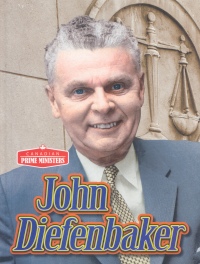| ________________
CM . . .
. Volume xxi Number 15 . . . . December 12, 2014
excerpt:
This introductory biography of Canada’s 13th prime minister achieves three primary goals: it provides students with a succinct outline of John Diefenbaker’s life, acquaints them with Canada’s electoral process and offers suggestions on biographical writing. John Diefenbaker (1985-1979) was born, in 1895, in a small Ontario town but, in 1903, the family moved west to the part of the Northwest Territories that would become Saskatchewan. Young John enjoyed reading political biographies, and, at an early age, the clearly ambitious boy decided that he would become prime minister one day. Students will take away the message that John Diefenbaker was a driven, hardworking individual who never wavered in his goal and never quit after suffering setbacks. He was a dedicated student who worked hard in school and became a skilled debater at the University of Saskatchewan. He received a Master of Arts degree and graduated from law school. Getting into political office was not easy for Diefenbaker. He ran unsuccessfully for a seat in the provincial legislature several times. Even though he lost elections, he never gave up, eventually winning a seat in the Saskatchewan Legislative Assembly and later becoming leader of the Saskatchewan Conservative Party. In 1940, he ran as a candidate for the federal Conservatives and won a seat in Canada’s parliament. In 1956, after his third try, he was elected party leader and, in the 1957 election, he finally achieved his life-long ambition of becoming Prime Minister. “I quit,” was not in John Diefenbaker’s vocabulary. Diefenbaker saw himself as a socially progressive “nation builder” who often challenged his party’s political platform. As Prime Minister, he wanted to implement policies that helped the country as a whole and all its peoples. He introduced legislation that improved social programs, gave First Nations People the right to vote, allowed Asian and African immigration into Canada, and, in 1960, created Canada’s Bill of Rights, the predecessor of the 1982 Canadian Charter of Rights and Freedoms, named the first female cabinet minister and opposed South Africa’s oppressive apartheid regime. The book’s “Write a Biography” section provides students with a useful concept web for doing their research and finding what needs to be included in a comprehensive biography. The book contains a timeline, a short glossary of political terms and a short index. The biography has a particularly glaring shortcoming in that it does not mention Saskatchewan’s other great politician, Tommy Douglas. As well, it does not point out the clashes Diefenbaker had with his chief political adversary, Lester Pearson, who defeated Diefenbaker to become Canada’s 14th prime minister. Recommended.
Ian Stewart teaches at Cecil Rhodes School in Winnipeg, MB.
To comment on this title or this review, send mail to cm@umanitoba.ca.
Copyright © the Manitoba Library Association. Reproduction for personal use is permitted only if this copyright notice is maintained. Any
other reproduction is prohibited without permission.
CM Home |
Next Review |
(Table of Contents for This Issue - December 15, 2014.)
| Back Issues | Search | CM Archive
| Profiles Archive |
